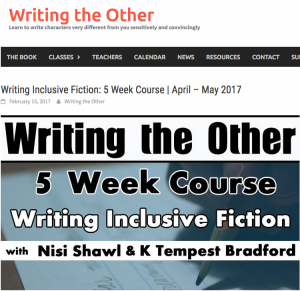They say you never stop learning and, whoever ‘they’ are, I hope they’re right. I love studying, extending my understanding of the world and those in it. So when the opportunity came along last month to apply for a scholarship for a five-week ‘Writing Inclusive Fiction’ course, I jumped at the chance. I sent off a sample of my writing and… I won a scholarship! Woo hoo!
Writing inclusive fiction involves looking at your stories to see if you can include a more diverse range of characters in terms of gender, religion, racial heritage, sexual orientation or other aspects of identity that differ from the ‘dominant paradigm’. The goal is to represent diversity with positivity and accuracy, and not proliferate negative stereotyping or cultural appropriation. The course took up a lot of time but I thoroughly enjoyed it and would recommend it to any writer interested in ensuring they represent diversity sensitively and convincingly. The course is for all writers from all backgrounds at any skill level. All you need is a willingness to learn, and when it comes to diversity I have that in oodles.
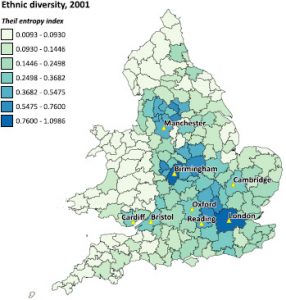 It all started when I was at school and took part in a group exercise on teamwork. Each group had to find a solution to a problem, but one person couldn’t participate in the discussions they just had to observe and make notes on how everyone contributed. In my group that observer was me, and I had to identify every time a person: suggested something new, encouraged everyone, pointed out a flaw, made a joke, summarised the situation, suggested compromise, directed the flow of conversation, etc. It quickly became apparent that you need a variety of skills and experiences to make a good team. Put all of the exact same type of people in a group and you won’t get very far. From that moment onwards I appreciated diversity in every shape or form on offer, and that appreciation led me to move away from my home at 18 to live in one of England’s most culturally diverse areas: Birmingham. Five years later, I moved again to live in England’s cultural capital: London. At University I took ‘Media & Cultural Studies’ and Psychology alongside my English degree, and studied feminism, race, sexuality and disability. I’d grown up with gay friends and relatives, with non-dominant religious beliefs, and with those building lives around visible and invisible disabilities – and I wanted only utter acceptance for everyone. I still do.
It all started when I was at school and took part in a group exercise on teamwork. Each group had to find a solution to a problem, but one person couldn’t participate in the discussions they just had to observe and make notes on how everyone contributed. In my group that observer was me, and I had to identify every time a person: suggested something new, encouraged everyone, pointed out a flaw, made a joke, summarised the situation, suggested compromise, directed the flow of conversation, etc. It quickly became apparent that you need a variety of skills and experiences to make a good team. Put all of the exact same type of people in a group and you won’t get very far. From that moment onwards I appreciated diversity in every shape or form on offer, and that appreciation led me to move away from my home at 18 to live in one of England’s most culturally diverse areas: Birmingham. Five years later, I moved again to live in England’s cultural capital: London. At University I took ‘Media & Cultural Studies’ and Psychology alongside my English degree, and studied feminism, race, sexuality and disability. I’d grown up with gay friends and relatives, with non-dominant religious beliefs, and with those building lives around visible and invisible disabilities – and I wanted only utter acceptance for everyone. I still do.
I now live in a country (Australia) that, I’m proud to say, values both its cultural heritage and welcomes new ones. Appropriation of Australia’s aboriginal culture is frowned upon with absolute severity. There are many improvements still to be made legally and culturally but this is a good start. Last night I was helping my daughter Ophelia with her public speaking speech on ‘Multiculturalism: Words Can Hurt’ and from her research I learnt that 83% of Australians agree multiculturalism is good for our country and society (the Mapping Social Cohesion survey, 2016).
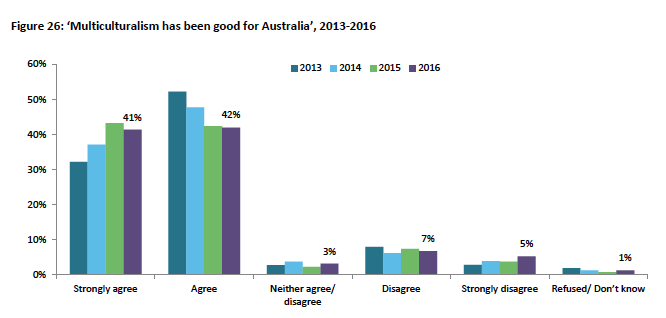
Mapping Social Cohesion 2016: National Report
Ophelia’s top tips for her fellow students were to:
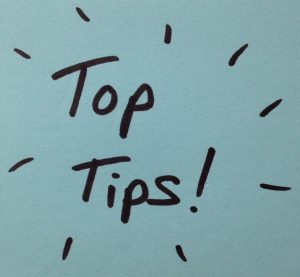 Use kind words to everyone around you, regardless of their race, origins, preferences or religion. Words and communication can unify us and make us strong.
Use kind words to everyone around you, regardless of their race, origins, preferences or religion. Words and communication can unify us and make us strong.- Think of everyone as individuals, not as stereotypes. Don’t use nasty labels, names or general remarks to judge people on their looks or what you think you know about them.
- Learn more about the cultures around you and celebrate the diversity they bring us. Words can heal. Just get to know each other and it’ll all be fine.
Aw, I will certainly try to follow those tips! We all know what it’s like to be judged unfairly by people assuming they know you but don’t! I won’t always do or say the right things, but I can always try.
I will also continue learning and expanding my knowledge, and do what I can with my writing to represent diversity sensitively and convincingly. I’m looking forward to the publication of my novel ‘Towards White’ this September/October and for readers to meet my protagonist, a woman with an invisible disability that doesn’t stop her from getting what she wants!
As a creative writing tutor, I can also teach others what I’ve learnt and spread the word, and I’ve been booked up to teach a plethora of writing classes for adults and young writers over the coming months (details under ‘Events‘ if you’re interested!):
- Creative Writing Essentials – Mosman Community College, 9am-3pm, 28 May.
- Writing Science Fiction & Fantasy – Mosman Community College, 5pm-8pm, 19 & 26 June.
- Upper Primary Focus and High School Focus to prepare keen writers for the Warringah Young Writers’ Competition – Dee Why Library, 11am-12.30pm and 1.30pm-4.30pm, 4 July.
- Problems in Wonderland and Upper Primary Focus – Forestville Library, 11am-12.30pm and 1.30pm-3pm, 5 July.
- Writing Technique Development Day – Mosman Community College, 9am-3pm, 6 July.
- Problems in Wonderland and High School Focus – Warringah Library, 11am-12.30pm and 1.30pm-4.30pm, 11 July.
- Problems in Wonderland and Upper Primary Focus – Glen Street Library, 11am-12.30pm and 1.30pm-3pm, 12 July.
- Write Your Own Book – Mosman Community College, 9am-3pm, 13 July.
- Turning Life Into Fiction – Mosman Community College, 5pm-8pm, 8 & 15 August.
- Creative Writing Essentials – Mosman Community College, 9am-3pm, 10 September.
- Make Talk Matter: Dialogue Masterclass – Manly Library for the Manly Arts Festival, 1pm-3.30pm, 23 September
Phew, that’s a lot of writing classes! Let’s hope I can make a difference somehow – we all can, whether we’re teaching or not. A few months ago I was renting a DVD from a nearby rental booth and was horrified to see two new categories and their contents. See if you can guess why:
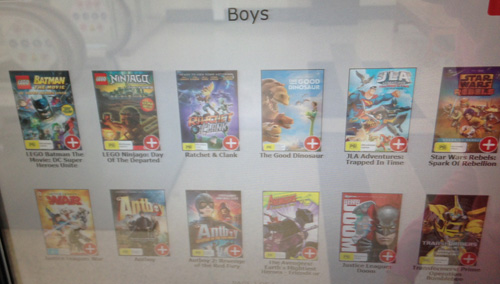
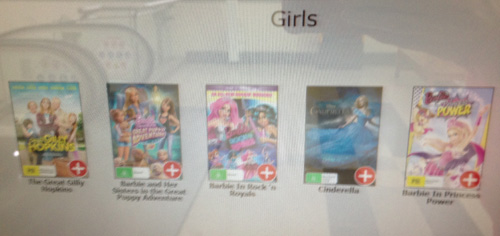
That’s right – all my favourite movies were in a category not designated for my gender! I phoned their customer service number immediately and suggested alternative categories. Within a week new categories were in place, which were much more descriptive and helpful for both parents and children, including ‘family’, ‘heroes’, ‘adventureland’ and ‘animated’. I was thrilled, and so were they – sometimes all it takes is a friendly nudge to point out something, something that might not be obvious to others (often because it’s subtle), and things can change.
Is there anything you almost walked-by but didn’t, or something you wish you could go back and change?
If so, why not share it with us?! I’d love to hear your stories!






